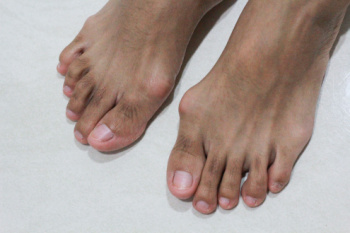Items filtered by date: October 2024
Diagnosing Top of the Foot Pain

Pain on the top of the foot can be a frustrating issue, often linked to several possible causes, including tendonitis, stress fractures, or arthritis. Tendonitis occurs when the tendons in the foot become inflamed due to overuse or wearing improper footwear, resulting in sharp, throbbing pain. Stress fractures, which are small cracks in the bones, usually develop from repetitive stress and can cause consistent discomfort, especially with increased activity. Arthritis, particularly osteoarthritis, can lead to pain when bone spurs form in the joints. A podiatrist will first ask about your medical history and perform a physical exam to assess whether the pain is sharp, dull, or worsened by certain activities. An X-ray or an MRI scan may be ordered to detect the cause. Ignoring this type of foot pain can lead to further problems. If you have unexplained pain on the top of the foot, it is suggested that you schedule an appointment with a podiatrist for an exam and treatment options.
Foot Pain
Foot pain can be extremely painful and debilitating. If you have a foot pain, consult with Donald Manger, DPM from Associated Podiatric Physicians, PA. Our doctor will assess your condition and provide you with quality foot and ankle treatment.
Causes
Foot pain is a very broad condition that could be caused by one or more ailments. The most common include:
- Bunions
- Hammertoes
- Plantar Fasciitis
- Bone Spurs
- Corns
- Tarsal Tunnel Syndrome
- Ingrown Toenails
- Arthritis (such as Gout, Rheumatoid, and Osteoarthritis)
- Flat Feet
- Injury (from stress fractures, broken toe, foot, ankle, Achilles tendon ruptures, and sprains)
- And more
Diagnosis
To figure out the cause of foot pain, podiatrists utilize several different methods. This can range from simple visual inspections and sensation tests to X-rays and MRI scans. Prior medical history, family medical history, and any recent physical traumatic events will all be taken into consideration for a proper diagnosis.
Treatment
Treatment depends upon the cause of the foot pain. Whether it is resting, staying off the foot, or having surgery; podiatrists have a number of treatment options available for foot pain.
If you have any questions, please feel free to contact our office located in Hamilton Township, NJ . We offer the newest diagnostic and treatment technologies for all your foot care needs.
Causes and Risk Factors for Gout

Gout is caused by an excess buildup of uric acid in the body, leading to the formation of sharp, needle-like crystals in the joints. Gout often affects the joint at the base of the big toe, resulting in sudden and severe pain, swelling, and redness. The affected area may feel warm, tender, and inflamed, making it difficult to put weight on the foot. These intense symptoms typically occur at night and can disrupt sleep. After the initial flare-up of gout, the extreme pain may subside, but discomfort and joint stiffness may persist for several days. Gout also may impact range of motion in the affected joint. Risk factors include a diet high in purine-rich foods, such as red meat and seafood, as well as excessive alcohol consumption and certain medications that raise uric acid levels. Other contributing factors include kidney disease, high blood pressure, and obesity. If you have symptoms of gout, it is suggested that you schedule an appointment with a podiatrist for a diagnosis and treatment options.
Gout is a foot condition that requires certain treatment and care. If you are seeking treatment, contact Donald Manger, DPM from Associated Podiatric Physicians, PA. Our doctor will treat your foot and ankle needs.
What Is Gout?
Gout is a type of arthritis caused by a buildup of uric acid in the bloodstream. It often develops in the foot, especially the big toe area, although it can manifest in other parts of the body as well. Gout can make walking and standing very painful and is especially common in diabetics and the obese.
People typically get gout because of a poor diet. Genetic predisposition is also a factor. The children of parents who have had gout frequently have a chance of developing it themselves.
Gout can easily be identified by redness and inflammation of the big toe and the surrounding areas of the foot. Other symptoms include extreme fatigue, joint pain, and running high fevers. Sometimes corticosteroid drugs can be prescribed to treat gout, but the best way to combat this disease is to get more exercise and eat a better diet.
If you have any questions please feel free to contact our office located in Hamilton Township, NJ . We offer the newest diagnostic and treatment technologies for all your foot and ankle needs.
Reasons You May Need Foot Surgery

Reconstructive foot surgery is performed to restore the anatomy and function of the foot when other treatment options are ineffective. It is typically recommended for severe foot conditions caused by trauma, birth defects, infections, or chronic diseases like diabetes. Common reasons for considering reconstructive foot surgery include major injuries, vascular diseases, and congenital deformities such as clubfoot. Surgical reconstruction may involve tendon transfers, tissue grafts, and in some cases, bone realignment. The goal is to improve foot function, reduce pain, and improve mobility. Recovery depends on the extent of the surgery and may take several months. A podiatrist can evaluate the best surgical options, guide your post-operative care, and help restore foot function through rehabilitation techniques. If you believe you may benefit from reconstructive foot surgery, it is suggested that you schedule an appointment with a podiatrist.
Foot surgery is sometimes necessary to treat a foot ailment. To learn more, contact Donald Manger, DPM of Associated Podiatric Physicians, PA. Our doctor will assist you with all of your foot and ankle needs.
When Is Surgery Necessary?
Foot and ankle surgery is generally reserved for cases in which less invasive, conservative procedures have failed to alleviate the problem. Some of the cases in which surgery may be necessary include:
- Removing foot deformities like bunions and bone spurs
- Severe arthritis that has caused bone issues
- Cosmetic reconstruction
What Types of Surgery Are There?
The type of surgery you receive will depend on the nature of the problem you have. Some of the possible surgeries include:
- Bunionectomy for painful bunions
- Surgical fusion for realignment of bones
- Neuropathy decompression surgery to treat nerve damage
Benefits of Surgery
Although surgery is usually a last resort, it can provide more complete pain relief compared to non-surgical methods and may allow you to finally resume full activity.
Surgical techniques have also become increasingly sophisticated. Techniques like endoscopic surgery allow for smaller incisions and faster recovery times.
If you have any questions please feel free to contact our office located in Hamilton Township, NJ . We offer the newest diagnostic and treatment technologies for all your foot and ankle needs.
Plantar Warts Can Be Treated!
Do Bunion Correctors Work?

Bunion correctors are popular devices designed to straighten the big toe and provide relief for people with bunions. While they may help reduce discomfort when worn, they have not yet been shown to be effective in permanently realigning the toe or eliminating the bunion. Some people report pain relief while using these devices, especially when walking or standing for extended periods. However, research is inconclusive about whether bunion correctors prevent further progression of bunions. At this point, surgery is the only proven method for removing bunions. Even so, it is typically reserved for cases causing significant pain or gait problems. A podiatrist can advise by prescribing custom orthotics, recommending changes in footwear, or performing surgery. If you have a problematic bunion, it is suggested that you schedule an appointment with a podiatrist for an exam and suggested treatment options.
If you are suffering from bunions, contact Donald Manger, DPM of Associated Podiatric Physicians, PA. Our doctor can provide the care you need to keep you pain-free and on your feet.
What Is a Bunion?
A bunion is formed of swollen tissue or an enlargement of boney growth, usually located at the base joint of the toe that connects to the foot. The swelling occurs due to the bones in the big toe shifting inward, which impacts the other toes of the foot. This causes the area around the base of the big toe to become inflamed and painful.
Why Do Bunions Form?
Genetics – Susceptibility to bunions are often hereditary
Stress on the feet – Poorly fitted and uncomfortable footwear that places stress on feet, such as heels, can worsen existing bunions
How Are Bunions Diagnosed?
Doctors often perform two tests – blood tests and x-rays – when trying to diagnose bunions, especially in the early stages of development. Blood tests help determine if the foot pain is being caused by something else, such as arthritis, while x-rays provide a clear picture of your bone structure to your doctor.
How Are Bunions Treated?
- Refrain from wearing heels or similar shoes that cause discomfort
- Select wider shoes that can provide more comfort and reduce pain
- Anti-inflammatory and pain management drugs
- Orthotics or foot inserts
- Surgery
If you have any questions, please feel free to contact our office located in Hamilton Township, NJ . We offer the newest diagnostic and treatment technologies for all your foot care needs.
What Can Cause a Foot Stress Fracture?

A foot stress fracture, often referred to as a hairline fracture, is a small crack in the bone caused by repetitive stress or overuse. This type of injury typically occurs in the metatarsals, the long bones in the middle of the foot. Common symptoms include localized pain that worsens with activity, swelling, and tenderness in the affected area. The pain may initially be mild but can intensify with continued use. Stress fractures are often caused by activities that involve high-impact or repetitive force, such as running or jumping. Factors such as sudden increases in activity, improper footwear, and having inadequate bone strength can contribute to their development. A stress fracture that occurs in the foot can cause severe pain and discomfort. If you have developed this type of injury, it is suggested that you consult a podiatrist who can effectively treat this condition.
Activities where too much pressure is put on the feet can cause stress fractures. To learn more, contact Donald Manger, DPM from Associated Podiatric Physicians, PA. Our doctor can provide the care you need to keep your pain free and on your feet.
Dealing with Stress Fractures of the Foot and Ankle
Stress fractures occur in the foot and ankle when muscles in these areas weaken from too much or too little use. The feet and ankles then lose support when walking or running from the impact of the ground. Since there is no protection, the bones receive the full impact of each step. Stress on the feet can cause cracks to form in the bones, thus creating stress fractures.
What Are Stress Fractures?
Stress fractures occur frequently in individuals whose daily activities cause great impact on the feet and ankles. Stress factors are most common among:
- Runners
- People affected with Osteoporosis
- Tennis or basketball players
- Gymnasts
- High impact workouts
Symptoms
Pain from the fractures occur in the area of the fractures and can be constant or intermittent. It will often cause sharp or dull pain with swelling and tenderness. Engaging in any kind of activity which involves high impact will aggravate pain.
If you have any questions please feel free to contact our office located in Hamilton Township, NJ . We offer the newest diagnostic and treatment technologies for all your foot and ankle needs.

